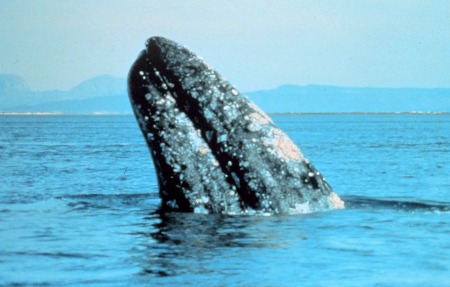Gray Whales Adapted to Survive Past Climate Changes

Gray whales managed to survive many cycles of global cooling and warming over the past few million years by changing their migratory habits and broadening their feeding styles, according to a new study.
The oldest gray whale fossils date back 2.5 million years, and since then, the Earth has gone through more than 40 major cycles of warming and cooling. The California, or eastern, gray whale is one of two surviving populations of gray whale and can be traced back about 150,000 to 200,000 years.
Gray whales appear to have "a lot more evolutionary plasticity than anyone imagined," said study author and evolutionary biologist David Lindberg of the University of California, Berkeley. After studying California gray whales' responses to climate change over the past 120,000 years, the researchers suggest that gray whales survived previous climate changes by broadening their feeding styles.
Gray whales were once thought to feed only by suctioning seafloor sediment and filtering out worms and amphipods, but some gray whales now eat herring and krill as well, just like their baleen whale relatives such as the humpback. The migration habits of gray whales proved to be flexible as well, with one group preferring to stop migrating altogether and remain off Vancouver Island in Canada year-round.
Furthermore, the researchers found evidence to support the idea that the population of gray whales along the Pacific Coast was about 76,000 to 120,000 before humans began hunting them. Previous estimates by ecologists placed the number at 15,000 to 20,000, but the new study's researchers say that the gray whales' feeding on a greater variety of food made it possible for higher populations to have flourished.
The whales' history of adapting to shifting conditions could help them survive future climate change over the next few centuries as sea levels continue to rise, the researchers said.
The paper was published today (July 6) in the journal PLoS ONE.
Sign up for the Live Science daily newsletter now
Get the world’s most fascinating discoveries delivered straight to your inbox.
You can follow LiveScience writer Remy Melina on Twitter @remymelina. Follow LiveScience for the latest in science news and discoveries on Twitter @livescience and on Facebook.










